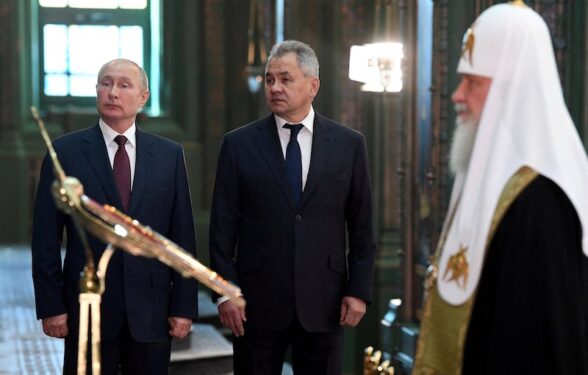
By Elise Ann Allen
ROME (Crux) — When Pope Francis visits Kazakhstan for a high-profile interfaith summit next month, he could meet with Russian Orthodox Patriarch Kirill in a move seen as controversial given Patriarch Kirill’s vocal support of the war in Ukraine.
The visit to Kazakhstan, which has been rumored for months, was confirmed by the Vatican on Monday in a statement saying Pope Francis will travel to Nur-Sultan, the Kazakh capital, Sept. 13-15 for the Congress of Leaders of World and Traditional Religions.
According to a Vatican itinerary published Tuesday, Pope Francis will meet with Kazakh President Kassym-Jomart Tokayev and civil authorities on his first night in Kazakhstan, and he will spend the next day at the congress.
After participating in a silent prayer that morning, Pope Francis will give a keynote address during the opening session. Private meetings will then be held among various religious leaders present.
He will celebrate a public Mass later that afternoon, and before leaving on his final day in Kazakhstan, the Pope will meet privately with members of the Jesuit order and will then hold a public meeting with bishops, priests, and religious in the country.
He will then give a speech during the reading of the final declaration and conclusion of the congress before departing again for Rome.
Patriarch Kirill has also been invited to the event, and the Moscow Patriarchate has said he plans to attend.
The Vatican did not offer any details about a potential meeting between Pope Francis and Patriarch Kirill. However, the time allotted for private meetings among religious leaders could provide an opportunity for a conversation between the two.
Pope Francis pulled the plug on a planned meeting with Patriarch Kirill in June in Jerusalem due to the diplomatic fallout such an encounter would have created, given Patriarch Kirill’s defense of the war in Ukraine on both spiritual and ideological grounds. In previous remarks, Patriarch Kirill said Russia is defending itself against western secularism, which he argued has violated “God’s law,” as well as a growing “Russophobia” among western nations.
Pope Francis and Patriarch Kirill had a first historic encounter in Havana, Cuba in 2016, marking the first time a Pope and Russian Orthodox patriarch had met, and the Jerusalem meeting was to be the second time they sat down in person. Since that encounter was called off, a potential meeting in Kazakhstan would be significant, especially in light of the current geopolitical context.
The two spoke by video call in March, during which, according to a Vatican statement, Pope Francis said there is no longer such a thing as a “just war” and that as pastors, they must not use “the language of politics, but the language of Jesus.”
Pope Francis, while not specifically identifying Russia as the aggressor, has repeatedly condemned the war and issued numerous calls for peace.
Many of his remarks on the war have been seen as controversial among Ukrainians — including comments suggesting that NATO could have provoked the war because it was “barking at Russia’s door,” there are no clear “good guys and bad guys” in the conflict, and that sending weapons to Ukraine is a mistake.
However, he has taken on a more critical edge when talking about the conflict in recent weeks, describing it as a “war of aggression.”And in an apparent rebuke of Patriarch Kirill’s justification of the war on religious grounds, Pope Francis said in a July 1 speech to a delegation of Orthodox leaders that attitudes of “expansionism and imperialism” have nothing to do “with the risen Lord, who in Gethsemane told his disciples to reject violence.”
Pope Francis has also made critical remarks about Patriarch Kirill himself, telling an Italian newspaper in May that the patriarch shouldn’t become “Putin’s altar boy.”
The Russian Patriarchate responded, saying it was “regrettable” that Pope Francis “chose the wrong tone” to discuss the contents of their March video call.
If the two should meet in Kazakhstan, they would certainly have a lot to discuss given all the public remarks that have been made by both ever since the war began on Feb. 24, with Russia’s invasion of Ukraine.
Among the top talking points would likely be the humanitarian situation and the need to open up humanitarian corridors to allow aid to reach those stuck in areas of heavy fighting or to facilitate their evacuation.
It could also be an occasion for Pope Francis to reiterate the Holy See’s availability to help negotiate a solution and bring an end to the war, as well as his desire to visit both Moscow and Kyiv.
In an interview with Reuters last month, Pope Francis said he was still hoping to travel to Kyiv depending on the condition of his knee, but that if he did, he wanted to visit Russia, too, in a bid to “serve the cause of peace.”
A visit to Russia, then, could also be floated during a potential sit-down between the two leaders.
Other points likely to come up include the need to protect and defend human life; the just war doctrine, which was discussed during their March video call; the religious dimension of the war; and their roles as Christian church leaders in peace efforts, in light of Patriarch Kirill’s use of Christianity to defend the war.
Whatever the two discuss, if they do meet, it will likely still be seen as controversial, and there will undoubtedly still be a degree of political fallout from those who see it as an inconvenient photo op taken at the expense of Ukrainian lives. However, the Vatican’s long-standing diplomatic policy is always to keep the door open since even a potentially charged discussion is better than nothing at all.

